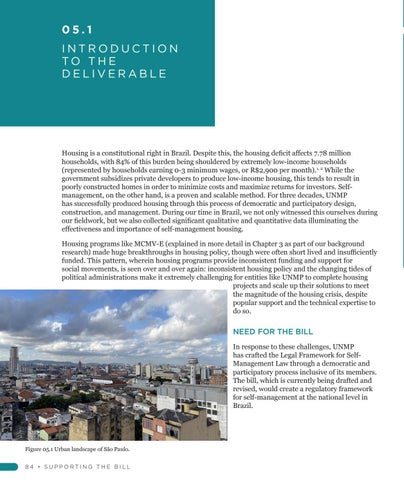05.1 INTRODUCTION TO T H E DELIVERABLE
Housing is a constitutional right in Brazil. Despite this, the housing deficit affects 7.78 million households, with 84% of this burden being shouldered by extremely low-income households (represented by households earning 0-3 minimum wages, or R$2,900 per month).1, 2 While the government subsidizes private developers to produce low-income housing, this tends to result in poorly constructed homes in order to minimize costs and maximize returns for investors. Selfmanagement, on the other hand, is a proven and scalable method. For three decades, UNMP has successfully produced housing through this process of democratic and participatory design, construction, and management. During our time in Brazil, we not only witnessed this ourselves during our fieldwork, but we also collected significant qualitative and quantitative data illuminating the effectiveness and importance of self-management housing. Housing programs like MCMV-E (explained in more detail in Chapter 3 as part of our background research) made huge breakthroughs in housing policy, though were often short lived and insufficiently funded. This pattern, wherein housing programs provide inconsistent funding and support for social movements, is seen over and over again: inconsistent housing policy and the changing tides of political administrations make it extremely challenging for entities like UNMP to complete housing projects and scale up their solutions to meet the magnitude of the housing crisis, despite popular support and the technical expertise to do so.
NEED FOR THE BILL In response to these challenges, UNMP has crafted the Legal Framework for SelfManagement Law through a democratic and participatory process inclusive of its members. The bill, which is currently being drafted and revised, would create a regulatory framework for self-management at the national level in Brazil.
Figure 05.1 Urban landscape of São Paulo. 84 • SUPPORTING THE BILL













